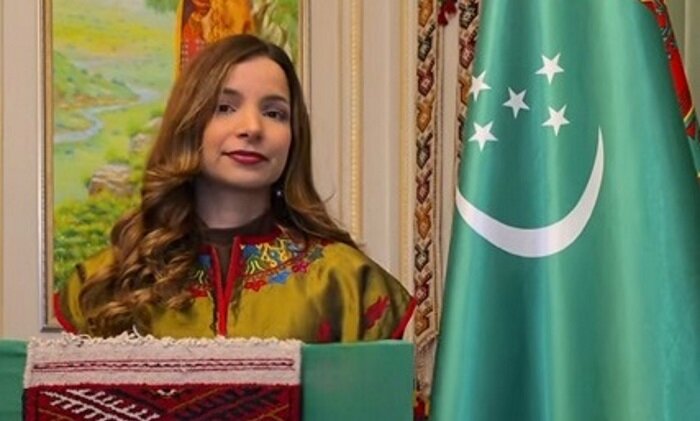The Turkmen language is far more than a means of communication — it is the heir to a rich and ancient heritage, a glorious history, a poetic tradition, and a vocabulary that reflects centuries of wisdom and beauty. It is the language of Magtymguly Pyragy, one of the greatest poets in the Turkic world, whose verses continue to resonate across generations and borders.
As someone deeply passionate about Central Asian languages, I have always wanted to learn Turkmen. Yet, I often encountered difficulties in finding reliable and comprehensive learning materials. That’s why I am not only delighted but truly enthusiastic about the publication of the Makul Dictionary, initiated and directed by legal scholar Dr. Dovran Orazgylyjov.
The “Makul English–Turkmen Dictionary: General, Law, Business, Medicine, AI, Sports” is a groundbreaking work that has already achieved remarkable success on Amazon, the world’s largest online bookstore. In the “Vocabulary Books” new releases category, it ranked #1 within its first days of publication — a clear sign of growing global interest in the Turkmen language and its relevance in today’s world.
But Turkmen is not only spoken in Turkmenistan. It is the mother tongue of millions of Turkmens in Afghanistan, Iran, and Türkiye, as well as hundreds of thousands more across Russia, Iraq, and other parts of the world. In Türkiye, in particular, there is a large population of Yörüks and Turkmens who are eager to reconnect with their linguistic roots. Even within my own family and circle of friends, many are interested in learning Turkmen, and I believe this dictionary is the best tool to support their journey.
Turkmen is a sister language to Azerbaijani, Turkish, and Uzbek. Learning Turkmen not only opens the door to understanding these languages but also strengthens cultural ties across the Turkic world. For English speakers, the Makul Dictionary is, in my opinion, the most complete and accessible resource ever published for learning Turkmen.
What makes this book even more valuable is its introductory section, which provides a rich overview of the history of the Turkmen language, the Turkmen people, and the Republic of Turkmenistan. This year, Turkmenistan celebrates 34 years of independence and 30 years of permanent neutrality — milestones that reflect the country’s commitment to peace, stability, and international cooperation.
The timing of this publication is deeply symbolic. Turkmenistan is increasingly recognized as a diplomatic leader in the region, known for its exemplary collaboration with the United Nations and its active role in promoting peace. In fact, 2025 has been declared the Year of Peace and Trust in partnership with the UN — a theme that resonates strongly with the values embedded in Turkmen culture and language.
Moreover, Turkmenistan is attracting growing foreign investment, and proficiency in Turkmen is becoming a strategic asset for business professionals, diplomats, and international organizations. Yet, despite its importance, artificial intelligence tools still struggle to translate Turkmen effectively. This makes the Makul Dictionary not only essential for learners but also a potential resource for improving AI models and digital language tools.
As a researcher of Central Asian languages — especially Uzbek and Turkmen — I consider this dictionary my primary and most trusted source for learning Turkmen. It is not only comprehensive but also includes clear explanations for each word, which greatly facilitates both translation and language acquisition.
Beyond its linguistic value, I believe this book will help build bridges between civilizations, connecting Central Asia with the Western world, and especially with Europe. Interest in Turkmenistan is growing within the European Union, and I know that even EU officials are beginning to explore the Turkmen language as part of their diplomatic and cultural engagement.
In Türkiye, the enthusiasm for learning Turkmen is especially strong. Millions of people with Turkmen heritage are seeking to reconnect with their ancestral language. The Makul Dictionary offers them a practical and culturally rich pathway to do so. I believe this book will become a cornerstone in the revival and global promotion of the Turkmen language.
I wholeheartedly congratulate Dr. Dovran Orazgylyjov for this remarkable achievement. I sincerely hope that the Makul Dictionary gains worldwide recognition — not only in Turkmenistan and Türkiye, but across the Turkic world, Europe, and beyond. It is more than a dictionary; it is a cultural bridge, a diplomatic tool, and a celebration of one of the world’s most beautiful languages.
Derya Soysal is a Belgian journalist and researcher accredited by the Ministry of foreign affairs of Turkmenistan and Uzbekistan. She works with international media outlets such as EU Reporter and she is Editor for EUReflect. She is recognized for her expertise in European Union–Central Asia relations. She is graduated from the Université libre de Bruxelles.
Her work includes academic presentations, participation in conferences, and media appearances that have significantly contributed to promoting Kazakhstan, Uzbekistan, Kyrgyzstan, Turkmenistan’s foreign policy — especially its doctrine of positive neutrality.
In 2025, her efforts have focused on supporting Turkmenistan’s international initiatives, notably the International Year of Peace and Trust, declared in cooperation with the United Nations. Her accreditation by the Turkmen Ministry of Foreign Affairs formalizes her role in strengthening humanitarian and informational dialogue between Turkmenistan and the global community.
Azat Nazarov: “The Makul Dictionary” is a convenience for those learning English

